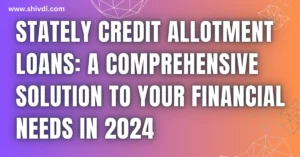In today’s financial landscape, access to credit plays a pivotal role in success and growth of any businesses, whether its small, medium, or large. Funding Circle is a prominent player in the realm of the business lending, it offers the platform that connects business borrowers with individual and institutional investors. This article will delves into the world of Funding Circle, exploring its credit check practices, benefits, pros and cons, and the variety of loans available, and much more.
Introduction to Funding Circle
Funding Circle is not like the traditional lending institutions. Instead, it operates as an online peer-to-peer lending marketplace, also connecting the business borrowers with a network of investors and willing to lend the capitals. Funding Circle founded in 2010, Funding Circle has become a prominent global player in the alternative lending sector that provide a platform for businesses to secure the financing while offering investors the great opportunities to earn returns on their investments.
The Credit Check Process
One of the most essential aspects of business lending, and lending in general is the credit check process. Before extending the loan, Funding Circle conducts a thorough credit evaluation of the borrowing business. This credit check is the fundamental step to assess the creditworthiness of the applicant and determine the terms of the loans.
The credit check process at Funding Circle typically includes the following components:
- Credit Score Assessment: Funding Circle considers the credit score of the business if you are applying for a loan. A higher credit score often results in more favourable loan terms.
- Financial Statements: Applicants are required to provide the financial statements that includes income statements, balance sheets, and the cash flow statements. These documents help to evaluate the financial health of the business.
- Business History: The duration for which the business has been in operation is the another crucial factor. Start-ups may have different requirements and terms compared to the established businesses, so it plays a vital role.
- Debt and Credit History: Funding Circle assesses the existing debt obligations and credit history of the business to gauge its ability to manage the other additional debt.
- Industry and Business Type: The nature of the business and the industry it operates is also influence the credit check process. Some industries may be perceived as riskier than others.
- Loan Purpose: The purpose of the loan, whether for expansion, working capital, or another specific use, is get considered during the evaluation.
Funding Circle’s credit check process is rigorous, actually it aims to strike a balance between facilitating access to capital for businesses and ensuring the safety of investments for lenders.
The Benefits of Funding Circle
Funding Circle offers several advantages to both borrowers and to the investors. Let’s explore some of the key benefits:
For Borrowers:
- Accessible Financing: Funding Circle provides an alternative to the traditional bank loans, also help in making the financing accessible to the businesses so that it may not meet the strict requirements of banks.
- Competitive Terms: Borrowers can access competitive interest rates and terms, making it easier to manage finances with fixed monthly payments.
- Speed and Convenience: The online application and approval process is often quicker and more convenient than traditional lending, also allowing the businesses to access funds when needed.
- Investor Diversity: Funding Circle connects borrowers with a diverse set of investors, and reduce reliance on a single financial institution.
- Transparency: Borrowers have access to transparent loan terms, that helping them to make the informed decisions.
For Investors:
- Diversified Portfolio: Investors can diversify their investment portfolio by lending to a variety of businesses.
- Earn Returns: Investors have the opportunity to earn competitive returns on their investments, often higher than the traditional savings or investment accounts.
- Supporting Small Businesses: Many investors are drawn to the idea of directly supporting the small and the medium-sized businesses and contributing to economic growth.
- Choice and Control: Investors have control over their funds that where they are allocated.
The Pros and Cons of Funding Circle
As with any financial service, Funding Circle has its own set of advantages and disadvantages. And it is essential to consider these factors before deciding if it’s the right choice for your business or not.
Pros:
- Flexible Financing: Funding Circle offers a range of loan products, and hence allowing businesses to find financing that suits their needs.
- Competitive Rates: Interest rates offered by Funding Circle can be competitive, but together saving businesses money on interest expenses.
- Speedy Process: The online application and approval process is typically faster than traditional lending, that makes it a viable option for businesses in need of quick capital.
- Investor Diversity: Businesses are funded by a diverse set of investors, and hence reduce the dependency on a single lender.
- Transparency: Funding Circle provides the transparency in terms of loan conditions, making it easier for borrowers to understand the commitment.
Cons:
- Credit Requirements: While Funding Circle may have more lenient credit requirements compared to the banks, but it still requires a decent credit score and financial history.
- Interest Rates: While rates are competitive, and they can be higher than those offered to businesses with top-tier credit.
- Loan Origination Fees: Funding Circle may charge origination fees, that may affects the overall cost of the loan.
- Risk of Non-Approval: Not all loan applications are approved or may be businesses need to explore other financing options if not accepted.
- Investor Expectations: Investors expect a return on their investment, so businesses must be prepared to meet the repayment terms.
In the world of alternative lending, Funding Circle stands out as a platform that offers numerous benefits to businesses for seeking capital. However, it’s essential to weigh the pros and cons carefully to determine if it aligns with your financial goals and this is more important.
Variety in Loan Offerings
Funding Circle provides a variety of loan offerings tailored to meet different business needs. These loan products cater to a range of purposes, from working capital to expansion and equipment financing. Some of the most common types of loans available through Funding Circle includes:
- Term Loans: These are the traditional loans with fixed interest rates and terms. And Businesses receive a lump sum and repay it over a specified period.
- Lines of Credit: A line of credit offers businesses to access a predetermined credit limit that they can draw from as their needed. And Interest is only paid on the amount drawn.
- Real Estate Loans: For businesses looking to acquire or refinance commercial properties, Funding Circle offers real estate loans with competitive terms.
- Asset Finance: This type of financing allows businesses to secure loans for the purchase of specific assets, such as machinery or vehicles.
- Invoice Financing: Businesses can use their outstanding invoices as collateral to secure financing, by providing an immediate cash flow boost.
- SBA Loans: Funding Circle partners with the Small Business Administration (SBA) to offer the government-backed loans with favourable terms.
- Business Expansion Loans: This Loan is tailored for businesses looking to expand, these loans offers funding for growth and development.
The variety of loan offerings allows the businesses to find a financing solution that best aligns with their specific goals and their requirements.
Eligibility Criteria
Funding Circle has eligibility criteria that businesses must have to meet to qualify for a loan. While these criteria may not be as strong as those of the traditional banks, but they are essential to maintain the quality and for the security of the loans provided. Some common eligibility criteria includes:
- Credit Score: For the Loan Businesses are often required to have a minimum credit score. The exact score required may vary based on the types of loan.
- Business Age: Funding Circle may require that businesses have been in operation for a certain period, typically a minimum of two years.
- Annual Revenue: Businesses are often required to meet a certain revenue threshold, the minimum annual revenue may vary based on the loan type.
- No Recent Bankruptcies: Businesses with recent bankruptcies or unresolved financial issues may not be eligible.
- Purpose of the Loan: Funding Circle may have specific loan products that are designed for the certain purposes, the intended use of the loan may influence the eligibility.
It’s crucial for businesses to review the eligibility criteria for the specific loan product they are interested in and also to ensure that they meet the requirements before applying for loan.
The Application Process
Applying for a loan through Funding Circle is typically a straightforward and transparent process. Here’s a general overview of the steps involved:
- Registration: Start by registering for an account on the Funding Circle platform. This includes providing the basic information about the business.
- Loan Application: Once registered, complete the loan application. This includes details about the loan amount, its purpose, and other relevant information.
- Documentation Submission: Business loans or any others loans are often required to submit financial documents, including income statements, balance sheets, and cash flow statements.
- Credit Evaluation: Funding Circle conducts a credit evaluation, that mainly assess the creditworthiness of the business.
- Loan Offers: If the application get approved, businesses receive loan offers with specific terms, including interest rates and the repayment schedules.
- Acceptance: Once you receive the acceptance letter review the offers and choose the best that suits your needs.
- Funding: Once the offer is accepted, the loan is funded by the investors on the platform.
- Repayment: At Last Businesses needs to make the regular monthly payments according to the agreed-upon schedule.
The online nature of Funding Circle’s platform simplifies the application and approval process, and provides a convenient way for businesses to secure financing.
Understanding Interest Rates and Fees
Interest rates and fees are crucial factors to consider when evaluating a loan offer. Funding Circle aims to provide competitive interest rates; however, these rates can vary based on several factors, including the creditworthiness of the borrower and the type of loan.
Interest rates on Funding Circle loans are typically fixed, meaning they remain the same throughout the loan term. This provides borrowers with predictability, as monthly payments remain consistent.
In addition to interest rates, businesses should also consider any associated fees. These fees may include:
- Origination Fees: Some loans may have an origination fee, which is a one-time fee that covers the cost of processing the loan.
- Late Payment Fees: If a business fails to make a payment on time, late payment fees may apply.
- Prepayment Penalties: Some loans may have prepayment penalties, which are fees incurred if the borrower pays off the loan before the agreed-upon term.
Understanding the interest rates and fees associated with a loan is essential for businesses to accurately assess the cost and determine the affordability of the financing.
Repayment Options
Repaying a loan through Funding Circle is typically straightforward and can be tailored to the needs of the business. The platform offers various repayment options, including:
- Fixed Monthly Payments: This is a common repayment structure where businesses make equal monthly payments throughout the loan term.
- Interest-Only Period: Some loans may offer an interest-only period, where businesses pay only the interest for a specified duration before transitioning to full principal and interest payments.
- Flexible Terms: Businesses may have the flexibility to choose loan terms that align with their cash flow and financial capacity.
- Automatic Withdrawals: Repayments are often set up as automatic withdrawals from the business’s bank account, ensuring timely payments.
It’s essential for businesses to discuss and clarify the repayment structure and options with Funding Circle to ensure that it aligns with their financial capabilities and goals.
Investor Participation
One of the unique aspects of Funding Circle is its reliance on a network of investors who provide the capital for loans. These investors play a crucial role in the lending process. Here’s how investor participation works:
- Investor Selection: Once a business applies for a loan and is approved, the loan request is listed on the Funding Circle platform. Investors review these loan listings and choose which loans they want to fund.
- Diverse Investors: Funding Circle’s investor base includes a wide range of individuals and institutions, contributing to the diversity and accessibility of the platform.
- Loan Funding: When investors commit to funding a loan, the funds are collected, and the loan is originated. This collaborative approach allows multiple investors to contribute to a single loan.
- Returns on Investment: Investors expect to earn a return on their investments through interest payments made by the borrowing businesses.
The involvement of multiple investors is a distinguishing feature of Funding Circle and allows businesses to access the necessary financing while providing investors with opportunities to earn returns on their capital.
Risks and Regulations
As with any financial service, there are inherent risks associated with borrowing through Funding Circle. It’s crucial for businesses to be aware of these risks and understand the regulatory environment. Some potential risks include:
- Credit Risk: Credit Risk is an inherent aspect of lending. It refers to the risk that borrowers may default on their loan payments. In the context of Funding Circle, businesses that secure loans through the platform may face financial challenges that hinder their ability to make repayments. This credit risk extends to investors who have funded these loans. In the event of default, investors could experience financial losses.
To mitigate credit risk, Funding Circle conducts a thorough credit assessment before approving loans. This assessment considers various factors, including the creditworthiness of the borrowing business, its financial stability, and its ability to service the debt.
- Regulatory Environment: The regulatory environment plays a crucial role in the peer-to-peer lending industry. The lending industry, including platforms like Funding Circle, is subject to regulatory oversight. Changes in regulations and government policies can impact the availability and terms of loans.Marketplace Stability: The stability of the peer-to-peer lending marketplace, including investor demand, can influence the availability of loans.
It’s essential for businesses and investors to stay informed about the regulatory landscape and how it might affect their activities on Funding Circle. Regulatory changes can influence interest rates, loan terms, and the types of loans available.
- Marketplace Stability: The stability of the peer-to-peer lending marketplace is another factor that can impact the availability of loans. This stability includes investor demand and the overall health of the platform. If investor demand wanes or if there are challenges within the platform’s operation, it can affect the ease of securing loans through Funding Circle.
Businesses should be aware of the marketplace’s stability and should consider diversifying their sources of funding to mitigate potential disruptions in loan availability.
- Economic Factors: Economic conditions have a significant impact on the financial health of businesses. Economic downturns or unfavorable conditions can affect a business’s ability to generate revenue and, subsequently, its capacity to repay loans. This presents a risk to both borrowers and investors.
It’s important for businesses and investors to assess the economic landscape and consider how it may impact their financial decisions. Diversifying revenue sources and building financial resilience can help businesses navigate economic challenges.
In conclusion, while Funding Circle offers a valuable platform for businesses seeking financing and investors looking to diversify their portfolios, it’s essential to be aware of the risks associated with borrowing and investing. Credit risk, regulatory changes, marketplace stability, and economic factors are all factors to consider when engaging with Funding Circle. By understanding these risks and taking proactive measures to mitigate them, businesses and investors can make informed financial decisions that align with their goals and risk tolerance.
How Cash Net USA and On Stride Financial Loans Can Affect Your Credit
Both Cash Net USA and On Stride Financial are online lenders that provide personal loans. When you borrow money from these lenders, it can have an impact on your credit. In this guide, we’ll explore how loans from these providers can affect your credit score and offer tips on managing your credit effectively.
Understanding Cash Net USA Loans
Cash Net USA is an online lender that offers short-term, small-dollar loans, often referred to as payday loans or cash advances. These loans are typically unsecured and are designed for individuals who need quick access to funds to cover unexpected expenses. Here’s how CashNetUSA loans can affect your credit:
Credit Check: A credit check, also known as a credit inquiry, is a process that lenders and financial institutions use to assess an individual’s creditworthiness when they apply for a loan or credit product. Credit checks can be categorized into two main types: soft credit checks (also called soft inquiries) and hard credit checks (also called hard inquiries). Let’s delve into the details of a soft credit check:
Soft Credit Check
A soft credit check is a type of credit inquiry that does not impact your credit score and is typically used for informational or pre-qualification purposes. Here’s what you need to know about soft credit checks:
- No Impact on Credit Score: When a lender or financial institution conducts a soft credit check, it leaves no trace on your credit report, and it does not affect your credit score in any way. Your credit score remains unchanged, and there are no visible footprints of the inquiry.
- Purpose: Soft credit checks are often used for pre-qualification or initial assessment. They help lenders evaluate whether you meet their basic eligibility criteria for a loan or credit product. For example, when you check your own credit score or when a credit card company sends you a pre-approved offer, they typically use a soft credit check.
- Common Scenarios: Soft credit checks are common in situations like background checks for employment, pre-approval for loans or credit cards, and when you check your own credit report. They provide a way for individuals and businesses to get a preliminary sense of your credit history without impacting your credit score.
- No Authorization Required: In most cases, you do not need to provide explicit authorization for a soft credit check. For instance, when a potential employer conducts a background check that includes a soft credit check, they typically do not need your permission.
- Examples: Soft credit checks may involve reviewing your credit report for information like your credit history, accounts, and public records. However, they do not reveal your credit score. As a result, soft credit checks do not affect your ability to secure credit or loans.
In shorts, a soft credit check is a credit inquiry that does not harm your credit score. It is often used for preliminary assessments and informational purposes. Whether you’re checking your own credit report being considered for pre-qualification for a financial product, or undergoing a background check, soft credit checks allow entities to review your credit information without any negative consequences for your credit score.
No Credit Reporting to Bureaus
Cash Net USA does not report your loan activity to the three major credit bureaus (Equifax, Experian, and TransUnion). This means that taking out a loan with Cash Net USA will not directly impact your credit score, whether positively or negatively.
When it comes to lending and credit, it’s important to distinguish between two types of credit reporting: positive reporting and negative reporting.
Positive Reporting: This is when a lender reports your on-time payments and responsible credit behavior to the credit bureaus. Positive reporting can help you build and improve your credit score over time because it demonstrates your creditworthiness and financial responsibility.
Negative Reporting: This occurs when a lender reports late payments, defaults, or other negative credit events to the credit bureaus. Negative reporting can have a significant adverse effect on your credit score because it indicates financial difficulties or a failure to meet credit obligations.
Now, let’s break down what the statement “Cash Net USA does not report your loan activity to the three major credit bureaus (Equifax, Experian, and TransUnion)” means in the context of your credit:
- No Positive Impact: When Cash Net USA does not report your loan activity to the credit bureaus, it means that your responsible, on-time payments to Cash Net USA will not have a positive impact on your credit score. In other words, these payments will not help you build or improve your credit history.
- No Negative Impact: On the flip side, the statement also means that if you have any issues with your loan, such as late payments or defaults, these negative events will not be reported to the credit bureaus. Consequently, your credit score won’t be negatively affected by your interactions with Cash Net USA.
In short, when Cash Net USA does not report your loan activity to the major credit bureaus, it implies that your financial interactions with the lender will have no direct impact on your credit score. Your credit score remains unaffected by your activities with Cash Net USA, both in terms of positive or negative credit history. This can be advantageous for individuals who are looking to borrow without affecting their credit profile, but it also means that responsible borrowing and on-time payments will not help them build or repair their credit.
Repayment
However, it’s essential to be aware that if you fail to repay your Cash Net USA loan and it goes into default, the lender may report the delinquency to collection agencies. These agencies may, in turn, report the default to the credit bureaus, which can have a negative impact on your credit score.
Repayment: When you borrow money from Cash Net USA or any lender, you are expected to repay the borrowed amount according to the terms outlined in your loan agreement. This typically includes making regular payments, which can be in the form of installments. Responsible repayment of your loan has no direct negative impact on your credit; in fact, it can have a positive effect as it demonstrates your ability to manage debt responsibly.
Default: A loan goes into default when a borrower fails to meet their repayment obligations. This may occur due to missed payments, non-payment, or other violations of the loan agreement. Defaulting on a loan is a serious matter and can result in several consequences:
- Collection Agencies: Lenders, including Cash Net USA, may attempt to collect the outstanding debt through internal collections or by engaging third-party collection agencies. These agencies are responsible for pursuing repayment on behalf of the lender.
- Reporting to Credit Bureaus: If the collection efforts are unsuccessful, the lender or the collection agency may report the delinquent debt to the major credit bureaus, such as Equifax, Experian, and TransUnion. This reporting indicates that the loan is in default and can have a significant negative impact on your credit score.
- Credit Score Impact: When a loan default is reported to the credit bureaus, it can result in a substantial drop in your credit score. A lower credit score can make it more challenging to qualify for future credit products and may result in higher interest rates if you are approved.
- Legal Actions: In some cases, lenders may pursue legal actions to recover the debt, which can lead to additional costs and legal consequences for the borrower.
Credit Score Impact
The reporting of a loan default to the credit bureaus can significantly affect your credit score and financial stability. It’s important to understand that loan defaults remain on your credit report for several years and can impact your ability to secure credit or loans in the future.
To avoid these negative consequences, it is crucial to manage your loans responsibly, make on-time payments, and communicate with your lender if you encounter financial difficulties. Defaulting on a loan should be a last resort, as it can have far-reaching implications for your credit and financial well-being.
On Stride Financial Loans
On Stride Financial offers unsecured personal loans designed for individuals with fair to good credit. Unlike payday loans, these are installment loans with fixed monthly payments. Here’s how On Stride Financial loans can affect your credit
Credit Check
When you apply for an On Stride Financial loan, the lender will conduct a hard credit check. A hard inquiry can have a temporary negative impact on your credit score. It’s essential to be confident in your loan application before proceeding to minimize unnecessary hard inquiries.
Credit Reporting
On Stride Financial reports your loan activity to the credit bureaus. This means that your payment history and any defaults will be recorded on your credit report. Timely payments can positively impact your credit score, while missed payments or defaults can harm it.
Impact on Credit Score
The impact of On Stride Financial loans on your credit score depends on how you manage the loan:
- Positive Impact: Making on-time payments on your On Stride Financial loan can have a positive impact on your credit score. It demonstrates your responsible credit behavior and this can contribute to improving your credit history.
- Negative Impact: Missing payments or defaulting on an On Stride Financial loan can have a negative effect on your credit score. Late payments and loan defaults are reported to the credit bureaus and can result in a lower credit score.
- Credit History: The loan and your payment history will become part of your credit report, contributing to your overall credit history. A positive credit history can help you qualify for better credit terms in the future, while a negative history can make it more challenging to secure credit.
Responsible Borrowing
It’s crucial to borrow responsibly and ensure that you can meet your loan repayment obligations before taking out an On Stride Financial loan. Responsible borrowing includes:
- Only borrow what you can afford to repay.
- Making payments on time to maintain or improve your credit score.
- Communicating with the lender if you experience financial difficulties to explore potential solutions.
In summary, On Stride Financial loans can impact your credit score both positively and negatively, depending on how you manage the loan. Responsible borrowing and timely payments are key to ensuring that your loan experience with On Stride Financial contributes positively to your credit history and financial well-being.
Tips for Managing Your Credit with Online Loans
Whether you choose Cash Net USA or On Stride Financial for your loan needs, it’s important to manage your credit responsibly:
- Borrow Wisely: Only borrow what you genuinely need and only if you can comfortably afford to repay. Avoid taking out loans for non-essential expenses.
- Read and Understand the Terms: Carefully review the terms and conditions of your loan agreement. Understand the interest rates, fees, repayment schedule, and any penalties for late payments or defaults.
- Create a Budget: Establish a budget that outlines your income and expenses. Ensure that you allocate enough funds to cover loan repayments without straining your finances.
- Make Timely Payments: Whether it’s with Cash Net USA or On Stride Financial, always make your loan payments on time. Timely payments have a positive impact on your credit score.
- Set Up payment Reminders: Consider setting up reminders for your loan payments to avoid accidentally missing due dates. Many financial institutions offer automatic payments, which can help ensure on-time repayments.
- Communicate with the Lenders: If you encounter financial challenges and are unable to make a payment, contact your lender immediately. Many lenders are willing to work with borrowers to find solutions, such as modifying the repayment plan.
- Avoid Unnecessary Loans: Refrain from taking out loans for non-essential expenses, especially if you’re already managing debt. Accumulating more debt than you can handle can lead to financial stress.
- Monitor Your Credit: Regularly check your credit report for accuracy. Reviewing your credit report helps you identify any errors and track your credit history. You can obtain a free credit report annually from each of the major credit bureaus.
- Act on Errors: If you discover errors or inaccuracies on your credit report, take steps to dispute and correct them. Inaccurate information can negatively impact your credit score.
- Avoid Multiple Applications: Limit the number of credit applications if you submit in a short period. Each application can result in a hard credit inquiry, which may temporarily lower your credit score.
- Plan an Emergency Fund: Consider your long-term financial goals and how your current borrowing fits into those plans. Responsible credit management involves planning for your financial future.
- Build an Emergency Funds: Having an emergency fund can help you cover unexpected expenses without relying on credit. It’s a financial safety net that can reduce the need for loans during times of crisis.
By following these tips, you can maintain control of your finances, build a positive credit history, and ensure that your experience with online loans positively contributes to your overall financial well-being. Responsible credit management is a key component of financial stability and success.
Customer Testimonial
Frequently Asked Questions
How do I apply for a loan on funding Circle?
Answer: To apply for a loan on Funding Circle, follow these steps:
- Visit the Funding Circle website.
- Complete the online application, providing information about your business and its financials.
- Await the review and approval process, during which Funding Circle assesses your creditworthiness.
- Once approved, you’ll receive a loan offer with the terms and interest rate.
- Review and accept the loan offer.
- After acceptance, Funding Circle will facilitate the funding of your loan.
- Repay the loan according to the agreed-upon terms.
What types of the loans does Funding Circle offer?
Answer: Funding Circle offers a range of loan products, including term loans, lines of credit, invoice financing, Small Business Administration (SBA) loans, and commercial real estate loans.
Does Funding Circle conduct a credit check?
Answer: Yes, Funding Circle does perform credit checks as part of its underwriting process. However, they use a holistic approach that considers various factors beyond just a credit score.
Are Funding Circle loans only for businesses, or can individuals apply?
Answer: Funding Circle primarily serves small and medium-sized businesses. While individual investors can participate, but generally individual borrowers typically use other lending platforms.
What should I do if I have concerns about my loan or investment through Funding Circle?
Answer: If you have concerns or questions about your loan or investment, it’s recommended to contact Funding Circle’s customer support. They can provide guidance and assistance to address your specific needs.
What is the minimum credit score for a job?
Answer: There isn’t a specific minimum credit score requirement for a job. While some employers may conduct background checks that include credit checks, the criteria vary by company and the nature of the job. It’s important to note that an individual’s credit history is just one aspect employers consider during the hiring process.
Can you fail a soft credit check?
Answer: No, you cannot fail a soft credit check. A soft credit check also known as a soft inquiry, does not impact your credit score, and it’s typically used for informational or pre-approval purposes. It doesn’t result in a pass or fail status.
Do financial Companies hurt credit score?
Answer: Financial companies such as lenders and credit card providers may conduct hard credit checks when you apply for credit. These hard inquiries can have a temporary negative impact on your credit score. However, responsible management of credit accounts can improve your credit over time.
What does funding circle do?
Answer: Funding Circle is a peer-to-peer lending platform that connects small and medium-sized businesses with investors. It offers various types of business loans, including term loans, lines of credit, and invoice financing.
What are the problems with the funding circle?
Answer: Common issues with Funding Circle can include the potential for higher interest rates for businesses with poor credit profiles, regulatory changes that affect loan availability, and the risk of credit default by borrowers. It’s essential to carefully assess whether Funding Circle aligns with your financial needs and risk tolerance.
Do finance companies do credit checks?
Answer: Yes, many financial companies, especially those that provide loans or credit products, conduct credit checks to assess the creditworthiness of the applicants. The results of these checks help in determine loan terms and interest rates.
Do finance companies hurt credit score?
Answer: it can lead to a temporary decrease in your credit score when finance companies conduct hard credit checks as part of the loan application process. However, responsible management of credit accounts and on-time loan repayments can positively impact your credit score over time.
Can you pass a credit check with no credit history?
Answer: Yes, it is possible to pass a credit check with no credit history. Some lenders often offers credit products and they are specifically designed for individuals with limited or no credit history. These may include secured credit cards or loans that require collateral.
How can I borrow money with bad credit?
Answer: Borrowing money with bad credit can be challenging, but options exist. You can consider:
- Exploring loans for bad credit.
- Applying for a secured loan using collateral.
- Seeking a co-signer with good credit.
- Working on improving your credit over time.
Who can conduct a credit check?
Answer: Credit checks can be conducted by various entities including lenders, banks, credit card companies, landlords, employers (with permission), and insurance companies. The purpose of the check and the type (hard or soft) can vary.
How many credit checks are bad?
Answer: Multiple hard credit checks within a short timeframe can negatively impact your credit score. However, credit scoring models typically group similar inquiries for a specific purpose (e.g., shopping for a mortgage) as a single inquiry to minimize the impact.
Do all companies check credit score?
Answer: No, not all companies check credit scores. The decision to check an individual’s credit score depends on the nature of the transaction or interaction. Many financial institutions and lenders check credit scores, but other businesses, like retailers or service providers may not check credit score.
Do companies do a soft credit check?
Answer: Some companies conducts soft credit checks for various purposes, such as pre-qualification for loans or assess your suitability for certain services. Soft credit checks do not impact your credit score.
Why would I fail a credit check for a phone?
Answer: You may fail a credit check for a phone only if your credit history shows a pattern of delinquent payments, a history of defaults on previous contracts, or if you have a low credit score. The specific reasons can vary by the phone provider’s criteria.
What companies do soft credit check?
Answer: Companies in various industries may perform soft credit checks, including:
- Lenders for pre-qualification purposes.
- Landlords conducting background checks on rental applicants.
- Insurance companies assessing policy applicants.
- Employers during pre-employment screening (with your consent).
Can I do a credit check on myself?
Answer: Yes, you can check your credit score and can obtain a copy of your credit report for free once a year from each of the major credit bureaus (Equifax, Experian, and TransUnion). You can also use credit monitoring services to track your credit on an ongoing basis.
Is 550 a good CIBIL score?
Answer: A CIBIL score of 550 is considered a low credit score. Lenders may view this score as a higher credit risk, making it challenging to qualify for loans or credit products with favorable terms.
Is CIBIL legal in India?
Answer: Yes, CIBIL (Credit Information Bureau (India) Limited) is a legal and authorized credit bureau in India. It is regulated by the Reserve Bank of India (RBI) and governed by the Credit Information Companies (Regulation) Act, 2005.
Does CIBIL score affect bank jobs?
Answer: CIBIL scores are not typically used as a direct factor in the hiring process for bank jobs. Bank jobs primarily consider qualifications, experience, and skills relevant to the role. However, a candidate’s financial responsibility may be evaluated for certain positions, particularly those involving in financial services.
Is 579 a low credit score?
Answer: Yes, a credit score of 579 is considered as a low credit score. It may hinder your ability to secure credit or loans with favorable terms. Improving your credit behavior can help in raising your score over time.
What is the CIBIL score for aspirant banker?
Answer: The CIBIL score required for an aspirant banker can vary by the specific bank and the position. Banks often consider other qualifications and criteria in addition to the CIBIL score when hiring for banking positions.
How can I increase my CIBIL score?
Answer: You can improve your CIBIL score by:
- Paying bills and loan Installment on time.
- Reducing credit card balances.
- Avoiding multiple credit applications in a short period.
- Checking your credit report for errors and disputing inaccuracies.
What is a hard check on credit?
Answer: A hard check, also known as a hard inquiry, occurs when a lender or financial institution reviews your credit report as part of a credit application. Hard inquiries can have a temporary negative impact on your credit score.
Should I worry about a soft credit check?
Answer: You generally don’t need to worry about a soft credit check. Soft inquiries have no impact on your credit score and are typically used for informational or pre-approval purposes.
Can credit checks be wrong?
Answer: Credit reports can contain errors, which is why it’s essential to regularly review your credit report for inaccuracies. Incorrect information on your credit report can negatively impact on your credit score and borrowing opportunities.
What is a good credit score?
Answer: A good credit score typically falls within the range of 700 to 749 or higher, depending on the credit scoring model. A good credit score can open up access to favorable loan terms and financial opportunities.
Can I get a mobile phone contract with bad credit?
Answer: While it can be more challenging to get a mobile phone contract with bad credit, some providers offer options for individuals with lower credit scores. These contracts may include higher deposits or may require a prepaid plan.
Why do companies do soft credit checks?
Answer: Companies perform soft credit checks to assess an individual’s creditworthiness for various purposes, such as pre-qualification, background checks, or just for determining eligibility for their services. Soft credit checks do not impact the individual’s credit score.
What is a light credit check?
Answer: A “light” credit check is another term for a soft credit check or soft inquiry. It’s a review of your credit report that does not affect your credit score.
Can banks see soft credit checks?
Answer: Banks typically have access to information about soft credit checks that are conducted on individuals. While these checks do not impact the credit scores, instead they provide insights into an individual’s credit-related activities.
Can someone do a soft credit check without permission?
Answer: A soft credit check typically requires the individual’s consent or a permissible purpose under the law. Unauthorized access to a person’s credit report without permission can be a violation of privacy and may have the legal consequences.
Does a hard credit check matter?
Answer: Hard credit checks, also known as hard enquire, can impact your credit score and may affect your ability to secure your credit or loans. It’s important to manage hard inquiries and only apply for credit when necessary.



















